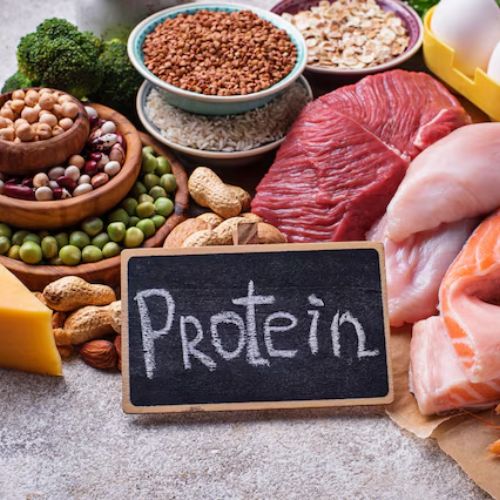Protein Ratio For A Longer Life
Did you know that low-protein diets have actually been found to extend the lifespan of rodents? That's got us thinking about potential benefits for us humans too. But reducing protein intake might have its downsides too. We're talking about compromising our overall quality of life here. You see when we don't get enough protein, it can actually worsen age-related muscle loss, which is known as sarcopenia. And trust us, sarcopenia can be a real problem, causing mobility and strength issues that mess with our independence. Not to mention the increased risk of falls and fractures. Ouch!
The optimal balance of nutrition for ideal health outcomes may vary across different life stages
So, finding the right balance in protein intake becomes crucial. Researchers from the Tokyo Metropolitan Institute of Gerontology in Japan did an intensive study with mice to figure out the optimal protein intake for metabolic health and muscle preservation. Their findings, published in GeroScience, revealed that a protein intake of around 35% was the sweet spot for maintaining the metabolic health of those middle-aged mice.
Dr. Yoshitaka Kondo, the lead author, had some interesting insights to share. He said, “The optimal balance of macronutrients for ideal health outcomes may vary across different life stages. Previous studies show the possibility of minimizing age-specific mortality throughout life by changing the ratio of dietary protein to carbohydrates during the approach to old age in mice. However, the amount of protein that should be consumed to maintain metabolic health while approaching old age is still unclear.”
The study showed that protein intake didn't have a significant impact on total muscle mass. However, here's the kicker—strength wasn't actually evaluated. So, we can't say for sure if low protein intake leads to sarcopenia in this context. So it’s still a bit of a mystery.
Now let's talk about those naughty fat cells in the liver. When they start piling up, it can lead to liver damage and raise the risk of some serious conditions like diabetes, heart attacks, and strokes. Not good news, right? Well, those middle-aged mice in the study had higher levels of liver fat compared to their younger counterparts. But hold your horses, when their protein intake went beyond 25% (in the P25, P35, and P45 groups), boom! The liver fat took a nosedive. So, it seems like a moderate amount of protein can keep that liver fat buildup in check, especially when we hit middle age.
The magic number seems to be 35% for reducing blood glucose levels.
And let's not forget about blood glucose levels, the troublemakers behind diabetes, and other nasty stuff. The study uncovered something interesting—middle-aged mice actually had lower blood glucose levels than their younger pals. And here's the kicker again, a protein intake of 35% resulted in even lower blood glucose levels compared to levels below 35%. But hey, don't go crazy with the protein party because a protein intake of 45% seemed to raise those blood glucose levels. So, the magic number here seems to be 35% for reducing blood glucose levels.
Now, we can't ignore those pesky free fatty acids that mess with our insulin resistance and contribute to high blood glucose levels. You guessed it, those middle-aged mice had higher levels of those bad boys floating around compared to the youngsters. A protein intake of 45% seemed to boost those levels even more. So, when we consider all the evidence, it looks like a protein intake level of around 35% is the ticket to optimize liver fat content, blood glucose, and those naughty free fatty acids.
To sum it all up, the findings from Dr. Kondo and the gang suggest that a protein intake of roughly 35% can work wonders for our metabolic health and put the brakes on metabolic aging. Since metabolic issues are linked to some seriously nasty diseases, it's safe to say that chowing down on moderate amounts of protein might just extend our precious time on this planet. We still don't have the full scoop on how protein intake affects muscle strength and that sarcopenia thing. So, let's keep our eyes peeled for more research to figure out the ideal protein intake for different age groups.
Dr. Kondo has some words of wisdom for us too. He says, “Protein requirements change through the course of life, being higher in younger reproductive mice, reducing through middle age, and rising again in older mice as protein efficiency declines. The same pattern is likely to be observed in humans. Therefore, it could be assumed that increasing daily protein intake in meals could promote metabolic health of people. Moreover, ideal dietary macronutrient balance at each life stage could also extend health span.”
How to optimize macronutrients?

And here's the fun part—the percentage of protein intake is determined by our total caloric intake. So, let's say we're rocking a 1,700-calorie diet. Our protein intake would be around 23.5% (yup, it's all about dividing [1,700 total calories / 800 calories from protein] x 100). Now, to figure out your daily protein, fat, and carb intake, you've got to keep track of those grams for every bite you take. It can be a bit of a chore, but fear not! There are nifty smartphone apps like My Fitness Pal that make the whole process a breeze.
So, there you have it—protein, fats, carbs, and a dash of science to keep us informed about the magical world of longevity.
Stay healthy and rock that well-balanced plate, folks!






